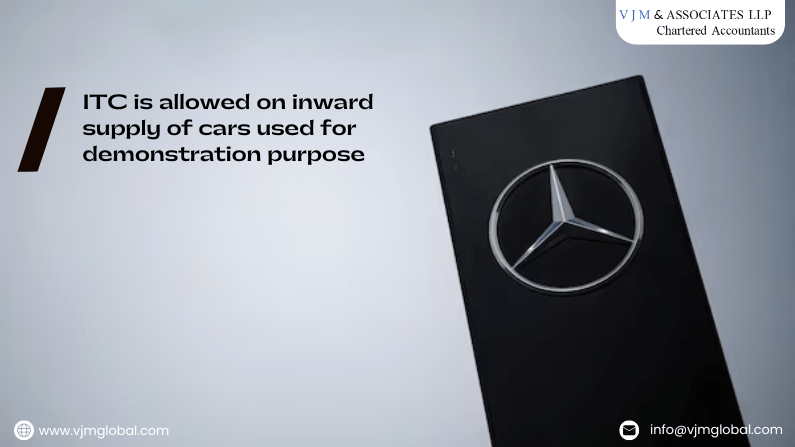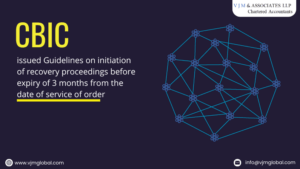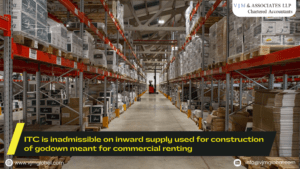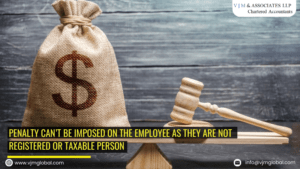Held by West Bengal Authority for Advance Ruling
In the matter of
M/s Landmark Cars East Private Limited (WBAAR 26 of 2023 )
The applicant is an authorised agent of Mercedes Benz India and is engaged in supply of car, spare parts and services. The applicant purchases demo cars from MB India and such cars are kept for demonstration and test drive purposes for a specific period of time. After completion of specified cars, such demo cars are purchased by the applicant from MB India and sold further to the end customer. Loss on sale of such demo cars, if any, is reimbursed by the MB india to the applicant.
Hon’ble AAR has held that:
- At the time of further supply, demo vehicle undergo some deterioration. However, it does not change the reality that the vehicle when supplied by the applicant has ceased to be such vehicle that was purchased. Therefore, restriction of ITC as imposed in section 17(5)(a)(A) of the GST Act is not applicable on purchase of demo vehicles which are supplied by the applicant after the specified time for providing test drive facility.
- As ITC is permitted on purchase of Demo cars, there would be no change of classification of the demo vehicle, at the point of sale by the applicant. Accordingly, the outward supply of demo car would attract same rate of tax of its inward supply.
- MB INDIA promise to compensate where the applicant would suffer a loss on sale of demo vehicle. Therefore, the applicant has entered into the agreement to tolerate the act of suffering loss for a consideration. Accordingly, such act is “agreeing to tolerate an act‘ having SAC 999794 is classifiable under “Other Miscellaneous services‘ and is taxable @ 18%.
1. Brief Fact of the Case
- The Applicant is an authorised agent of Mercedes Benz India Private Limited (“MB India”) , and is engaged in supply of car, spare parts supply and car servicing such as repair, warranties etc.
- The Applicant functions as a self-employed commercial agent with the responsibility of brokering the sales of vehicles on behalf of MB INDIA as direct sale to end customers.
- The relationship between MB INDIA and the applicant is of a principal and agent wherein MB INDIA is the principal and the applicant acts as the agent, i.e, representing and working on behalf of MB INDIA.
- For the service provided, the applicant is entitled to receive the commission.
- As per the agreement entered into between the Applicant and the MB India:
- The MB India will provide the Applicant with a sufficient number of Demo Cars to demonstrate the goods to the customer.
- Authorised agents may buy the demo cars on its own account. MB India may sell the demo cars to the authorised agent on request at the discounted price, as per MB India policy.
- The rights, title and ownership of the Demo vehicles shall vest with the authorised agent in its own capacity and not in its capacity as an Agent.
- Such demo cars shall be used for demonstration purposes only.
- The authorised agent may request MB INDIA for de-fleeting the Demo vehicle. Once the Demo vehicle is de-fleeted, the authorised agent shall liquidate and sell the Demo vehicle to the end customer only.
- If an authorised agent incurs losses on sale of Demo vehicles, MB INDIA shall reimburse the authorised agent for such losses.
- If a demo car does not comply with the policy, the demo discount initially provided will be reversed with GST interest as a cost.
- The Applicant issues a Tax Invoice to MB INDIA for reimbursement amount alongwith GST @ 18% considering it as a supply of services in terms of Section 7(1A) of the GST Act and classifying the service vide Schedule II entry 5(e) of the GST Act.
2. Question before Hon’ble AAR
The applicant has raised following questions before the hon’ble AAR:
- Whether the applicant is entitled to claim ITC of GST Charged by MB India on sale of Demo Cars to the Applicant which are used for demonstration purpose to the potential customer?
- What would be the classification and GST rate at the time of sale of the demo car, if the answer to the first question is yes or no?
- Whether the amount received by the applicant towards reimbursement of loss on Sale of Demo Car would constitute as supply? If yes, what is the classification and rate of tax of the same under GST?
3. Relevant Legal Extract
Relevant extract of the law is reiterated below for ready reference:
“(5) Notwithstanding anything contained in sub-section (1) of section 16 and sub- section (1) of section 18, input tax credit shall not be available in respect of the following, namely:—
(a) motor vehicles for transportation of persons having approved seating capacity of not more than thirteen persons (including the driver), except when they are used for making the following taxable supplies, namely:—
(A) further supply of such motor vehicles; or
(B) transportation of passengers; or
(C) imparting training on driving such motor vehicles;”
4. Contention of the Applicant
The Applicant contended that:
a. Admissibility of ITC
- Demo cars are purchased by the Applicant from MB India at discounted price alongwith GST. The applicant, after receipt of the demo vehicles, records the same as purchase of inventory (Stock in Trade) in its books of accounts and when the cars are sold, they are removed from the inventory and entire sale proceeds are accounted for in the Sales account.
- Presently, the applicant is availing the ITC on such demo cards in column 4(A)(5) of GSTR 3B and then immediately reverses the same in 4B(2) column of GSTR 3B due to legal confusion.
- Used in the course and furtherance of business:
- The Demo cars are an indispensable tool for promoting sales. It allows potential customers to experience the vehicle first-hand through test drives.
- These vehicles are acquired as a business necessity to support the dealership’s sales and marketing efforts.
- As per Section 16(1) of CGST Act, every registered person is entitled to take ITC on purchase of goods if the same are used in the course or furtherance of the business.
- In the present case as well, demo cars are purchased with clear intent of using them for test drives and in the furtherance of their business activities.
- Therefore, procuring demo vehicles is undeniably in the course of furtherance of business. Therefore, the applicant meets the conditions specified in section 16(1) for claiming ITC on demo vehicles.
- Ineligible ITC under Section 17(5) of CGST Act:
- Section 17(5)(a) of the GST Act restricts availability of ITC on motor vehicles purchased by a taxpayer even though they may be used in the course of furtherance. However, such a clause of business is not applicable in this case.
- Section 17(5)(a)(A) does not specify a timeline by which a purchased car is required to be resold. It simply requires that the intent to resell the car exists. The Car dealers are explicitly involved in the buying and selling of cars, there is no dispute regarding their eligibility for ITC, including for demo cars used in the process of selling cars and subsequently sold.
- As per section 17(5)(a)(A), ITC on motor vehicles shall not be allowed except when they are used for further supply of such motor vehicles. The term “Such” refers to in “further supply of such motor vehicles” refers to the specific motor vehicle that has been acquired and encompasses all vehicles acquired for the purpose of resale, including demo vehicles.
- The applicant relied on various judgements.
b. GST rate on sale of Demo cars
The applicant charges GST on such Demo cars as old and used motor vehicle and therefore follows the margin scheme specified in Notification No. 8/2018-Central Tax (Rate) dated 25.01.2018.
c. Classification of Reimbursment of Loss on sale of demo Cars
- As per Clause (1)(a) of the Section 7 of the CGST Act, 2017, all kinds of supply of goods or services made or agreed to be made for a consideration in the course or furtherance of business is to be treated as supply.
- Schedule-II provides a list of activities which are to be treated as supply of services or goods.
- In order to classify an activity as supply of goods or service, such transaction should first classify as supply
- Therefore, if any person agrees to an obligation to refrain from an act or tolerate any act or situation or to do an act which also satisfies the conditions of Section 7(1), then only it can be treated as supply of service under clause 5(e) of Schedule-II read with Section 7(1A).
- In the given case, the applicant is initially bearing the loss and subsequently recovering it from MB INDIA. This aligns with the concept of ‘tolerating an act or a situation’ as encompassed in the expression of bearing a loss against the agreed consideration.
- Therefore, the applicant raised an invoice for reimbursement along with GST at the rate of 18%.
- However, the applicant is of the view that such transaction should be treated as a part of the main supply, and hence, MB INDIA is required to issue a credit note for the same.
- The Initial invoicing is done for a agreed price. As per the policy, if authorised agent occurs the loss during the sale, MB INDIA commits to reimburse this loss. Conversely, if a profit is realized, MB INDIA retains the right to recover this profit.
- Therefore, in both situations – the reimbursement of losses and the recovery of profits – these financial transactions are inherently linked to the sale of the demo car.
- Hence, rather than treating these transactions as separate and potentially taxable supplies of services under the category of ‘tolerating an act‘, MB INDIA should issue specific Credit Notes in the case of a loss incurred during the demo car sale and Debit Notes when a profit is realized in alignment with the provisions of Section 34 of the GST Act.
5. Analysis by Hon’ble AAR.
The Hon’ble AAR made following finding and analysis:
a. Admissibility of ITC on purchase of Demo Cars:
- Section 17(5) overrides Section 16(1) of CGST Act and restricts ITC under certain scenarios. One of such restriction is with respect to motor vehicles.
- Accordingly, ITC on motor vehicles used for transportation of persons can be availed when such motor vehicles are:
- supplied further, or
- used for transportation of passengers, or
- used for imparting training on driving such motor vehicles.
- The applicant contended that the applicant makes further supply of such vehicles, though at a later point in time. Further, there is no time limit prescribed for making such further supplies.
- Therefore, the issue to decide is whether the purchases of vehicles used for demonstration and test drive purpose and subsequently supplied can be regarded as purchases made for further supply of such vehicle.
- As per business model, the demo vehicles are kept by the applicant for a certain period of time as per the company policy.
- The applicant carry out the responsibility of brokering the sales of vehicles as an agent for which he receives commission. Purchases of demo vehicles are made in its own account whereby rights of title to and ownership of the Demo vehicles vest with the applicant.
- The applicant records the same as purchase of inventory (Stock in Trade) in its books of accounts and when the cars are sold, they are removed from the inventory and entire sale proceeds are accounted for in Sales account.
- Such demo vehicle are supplies at a price which may be lower than the purchase value. However, the provisions of the GST Act nowhere specifies that ITC shall not be available in respect of any outward supplies which is made at a price lower than its procurement value.
- section 17(5)(a)(A) restricts ITC in respect of motor vehicles, with a specific seating capacity, for transportation of persons except when they are used for further supply of such motor vehicles.
- We are of the view that the word “such” as used in the expression “further supply of such vehicles‘ relates to the vehicle only that was purchased.
- At the time of further supply, As the condition of a demo vehicle has undergone some deterioration. However, it does not change the reality that the vehicle when supplied by the applicant has ceased to be such vehicle that was purchased.
- The demo vehicles are purchased all along for further supply with the condition that they will be kept for a specific period of time.
- Therefore, restriction of ITC as imposed in section 17(5)(a)(A) of the GST Act is not applicable on purchase of demo vehicles which are supplied by the applicant after the specified time for providing test drive facility.
b. GST Rate on sale of Demo Cars
- Chapter 87 of the CUSTOMS TARIFF ACT,1975 deals provides following 2 HSN Codes:
| HSN Code | Description |
| 8702 | motor vehicles for the transport of ten or more persons, including the driver |
| 8703 | motor cars and other motor vehicles principally designed for the transport of persons (other than those of heading 8702) |
- As ITC is permitted on purchase of Demo cars, there would be no change of classification of the demo vehicle, at the point of sale by the applicant.
- Accordingly, the outward supply of demo car would attract same rate of tax of its inward supply subject to the provision of section 14 of the GST Act.
c. Reimbursement received from MB India would be construed as Supply or not?
- Circular No. 178/10/2022GST dated 03.08.2022 has clarified that:
- Service of agreeing to the obligation to refrain from an act or to tolerate an act or a situation, or to do an act is nothing but a contractual agreement.
- A contract to do something or to abstain from doing something cannot be said to have taken place unless one party expressly or impliedly agrees to do or abstain from doing something and the other agrees to pay consideration for the same.
- There must be a necessary and sufficient nexus between the supply and the consideration.
- Further, it is to be checked that whether the impugned payments constitute consideration for another independent contract. If the answer is yes, then it constitutes a “supply‟ within the meaning of the Act, otherwise it is not a “supply”.
- One of the key elements of “consideration‘ that is the monetary value in respect of supply of goods or services or both.
- As per CESTAT, a distinction needs to be drawn between a consideration under a contract and the compensation or damages under a contract. The compensation- either liquidated or unliquidated cannot be equated with the consideration. While consideration is a result of execution of the contract, the damages are a result of frustration of the contract.‟
- In the given case, MB INDIA enters into the agreement with a promise to compensate where the applicant would suffer a loss on sale of demo vehicle.
- This compensation is paid as a result of the contract and therefore would qualify to be a “consideration‘.
- In the given case, the applicant has entered into the agreement to tolerate the act of suffering loss for a consideration.
- Therefore, “agreeing to tolerate an act‘ having SAC 999794 is classifiable under “Other Miscellaneous services‘ and is taxable @ 18% vide serial number 35 of Notification No. 11/2017-Central Tax I(Rate) dated 28.06.2017, as amended.
6. Ruling
Hon’ble AAR has held that:
Q1: Eligibility of ITC on Demo Cars
The applicant is entitled to claim ITC on purchase of demo car if such cars are supplied further after a specified time period.
Q2: GST rate on sale of demo cars
The Demo cars would be classified under Chapter 8702 or 8703, as the case may be. Outward supply would attract same rate of tax of its inward supply subject to the provision of section 14 of the GST Act.
Q3: Whether reimbursement of loss on sale of demo car is considered as supply or no?
The amount received towards reimbursement of Loss on Sale of Demo Car shall be regarded as consideration received for “agreeing to tolerate an act‘ (SAC: 9997974) and would be taxable @ 18%.






